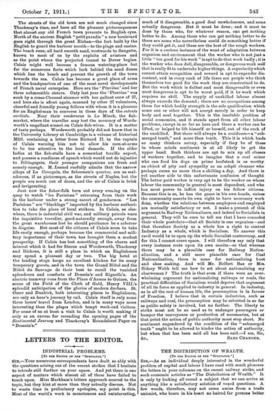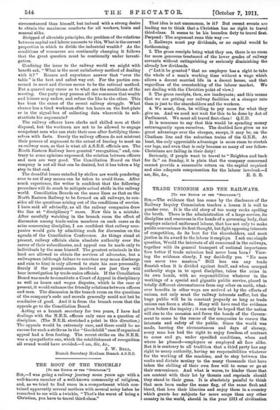THE DISTRIBUTION OF WEALTH.
[To THY EDITOR OF THE " SPECTLTOR.1 Sra,—As an individual deeply interested in the wonderful problem of capital and labour I have read with much pleasure the letters in your columns on the recent railway strike, and such economic articles as "The Distribution of Wealth." It is only by looking all round a subject that we can arrive at anything like a satisfactory solution of vexed questions. A few words, therefore, may not come amiss from a trade unionist, who bears in his heart no hatred for persons better
circumstanced than himself, but imbued with a strong desire to obtain the maximum comforts for all workers, brain and manual alike.
Stripped of altruistic principles, the problem of the relations between capital and labour amounts to this, What is the correct proportion in which to divide the industrial wealth ? As the conditions of commerce are continually changing it follows that the great question must be continually under investi- gation.
Confining the issue to the railway world we might with benefit ask, " What is the most satisfactory method of dealing with it P " Reason and experience answer that "over the table " is the best and safest way out. For the parties con- cerned to meet and discuss seems to be the rational method. But a quarrel may ensue as to what are the conditions of the meeting. One party may possess all the resources that wealth and leisure may endow, and refuse the like to the other. This has been the cause of the recent railway struggle. What chance has a tired workman after ten hours on the foot-plate or in the signal-box of collecting data wherewith to sub- stantiate his arguments ?
The railway officers have clerks and skilled men at their disposal, but the workmen are not to be allowed to engage competent men who can state their case after fortifying them- selves with facts. Surely the railway officers do not mistrust their powers of argument to the extent of fearing to meet an ex-railway man, as that is what all A.S.R.S. officials are. The North Eastern Railway have granted " recognition," and, con- trary to some opinions expressed, the relation between officers and men are very good. The Conciliation Board on that company is not all that can be desired, but it has taken a big step to that end.
The dreadful losses entailed by strikes are worth pondering over to see if any means can be taken to avoid them. After much experience, the writer is confident that the following procedure will do much to mitigate actual strife in the railway world. Conciliation Boards on the same lines as that on the North Eastern Railway to be formed on all railways, to con- sider all the questions arising out of the conditions of service.
I have said all advisedly, as all the railway companies draw the line at " disciplinary " cases. Now this is a mistake. After carefully watching in the branch room the effect of discussion among trade-union members on such cases as do arise concerning discipline, I am confident that railway com- panies would gain by admitting such for discussion on the agenda of the Conciliation Conference. As things stand at present, railway officials claim absolute authority over the career of their subordinates, and appeal can be made only to individuals by the man himself. The greatest criminals in the land are allowed to obtain the services of advocates, but a railwayman (although failure to convince may mean discharge and ruin to him) is only allowed to state his case personally. Surely if the punishments involved are just they will bear investigation by trade-union officials. if the Conciliation Board was made to constitute a Court of Appeal in disciplinary as well as hours and wages disputes, which is the case at present, it would enhance the friendly relations between officers and men. The discussion in the branch room on the questions of the company's code and morals generally could not but be conducive of good. And it is from the branch room that the appeals go to the Conciliation Board.
Acting as a branch secretary for two years, I have had dealings with the N.E.R. officers only once on a question of discipline. (The N.E.R. stretched a point in this direction.) The appeals would be extremely rare, and there could be no excuse for such a strike as in the " Goodchild " case if organized appeal had a firm footing. The recent strike on the N.E.R. was a sympathetic one, which the establishment of recognition all round would have avoided.—I am, Sir, &c.,
J. W. BELL, Branch Secretary Hexham Branch A.S.R.S.































































 Previous page
Previous page